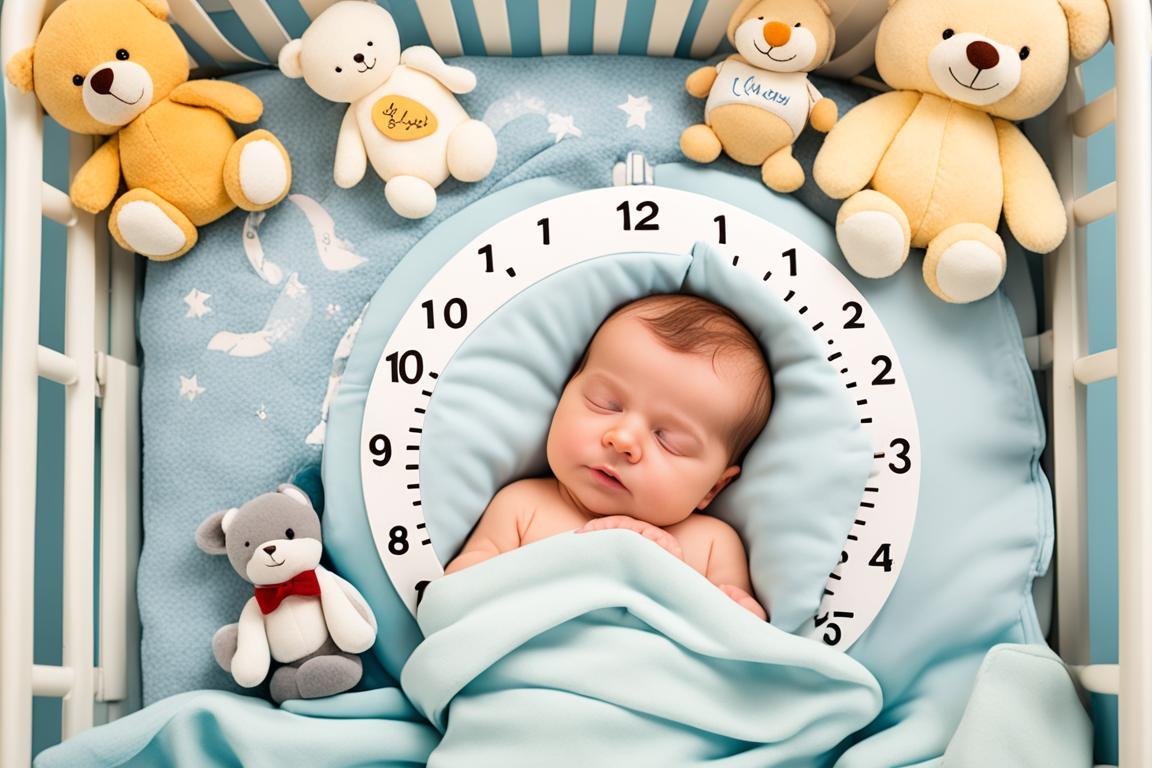Are you a new parent wondering when baby will sleep longer at night? Knowing about infant sleep is key to help your child sleep better.
Newborns usually sleep longer at night by 8-9 months. At first, their sleep can be all over the place. They sleep, wake up a lot to eat, and sleep again. But, by 6-8 weeks, babies start sleeping more at night, for 4-6 hours straight.
Your baby is ready to sleep longer at night if they show social smiles and don’t mix up day and night. As they get older, their body also starts making more melatonin. Watch for these signs to know when your baby is ready for more sleep at night.
Key Takeaways
- Newborns typically start sleeping for longer stretches at night around 8-9 months of age.
- In the early weeks, newborn sleep patterns are erratic, with babies spending most of their time sleeping and waking frequently to eat.
- Around 6-8 weeks, babies start developing more consistent sleep cycles and can sleep for longer periods at night, often 4-6 hours.
- Social smiles, resolution of day/night confusion, and increased melatonin production are signs that a newborn is ready for longer sleep.
- Establishing healthy sleep habits, such as a consistent bedtime routine, can help support your newborn’s sleep development.
Understanding Newborn Sleep Patterns
When your baby is born, you’ll see their sleep isn’t regular. They spend most of their time sleeping. Yet, they wake a lot to feed. They are getting used to life outside the womb. That’s why their sleep isn’t like ours yet.
The Eat-Sleep-Poop Cycle
Most babies eat, sleep, and poop a lot. They don’t spend much time awake. This is how they start to get used to their new home. They have short naps and wake up often because of this.
Adjusting to Life Outside the Womb
When babies leave the womb, it’s a big change. Their sleep changes as they adapt to their new world. They’re learning to sleep like older babies do. And they’re getting used to new things around them.
Surviving the First 6 Weeks
The first 6 weeks with a newborn are tough. You’ll be up a lot, caring for your baby. Rest when you can. Avoid making a routine that is hard to keep up with, like rocking your baby to sleep every time. Distinguish between day and night for your baby. Keep things bright and active during the day. Then, make things quiet and dark at night. This will help your baby learn when it’s time to sleep.
Sleep Survival Stage
Newborns sleep a lot, up to 18 hours a day in the first 6 weeks. They take short naps, about 3 to 5 times a day. Nighttime sleep in long stretches happens every 2 to 4 hours. A baby under 6 weeks can only be awake for a short time before needing to sleep again.
Avoiding Sleep Associations
Avoid getting your baby used to things that make it hard for them to sleep alone. Sleep expert Britteny Stefanic says babies can’t stay awake long when they’re very young. Setting good sleep routines early helps your baby rely on themselves to sleep.
Differentiating Day and Night
Teach your baby the difference between day and night. Let in natural light during the day. Make their space dark at night. This helps them get used to a day and night schedule. It also helps them sleep better, making things easier for you.
When Do Newborns Start Sleeping Longer
Your newborn may start to sleep longer at night around 8-9 months old. This is when they show they’re ready and solve common sleep problems.
Signs of Readiness: Social Smiles
Social smiles are a key sign your baby is ready to sleep longer. They appear between 6-8 weeks. These smiles show they’re learning and starting to comfort themselves, which helps them sleep longer.
Day/Night Confusion Resolves
Day/night confusion getting better is another sign. This often happens at the same time as social smiles. Once this confusion is gone, babies wake up less at night, so they sleep longer.
Biological Changes and Melatonin Production
Babies start to self-soothe and make a little melatonin around this time. These changes are also a big part of them sleeping more at night. Some babies sleep for 4 to 6 hours, and a few even for 8 hours at a stretch.
Knowing these signs and changes can help you help your baby sleep better. You can support their sleep development towards longer, more solid sleep.
Establishing Healthy Sleep Habits
Having good sleep habits is very important for your newborn’s growth. You can do this by keeping a regular bedtime and knowing your baby’s signs. This helps them sleep longer at night.
Bedtime Routine
Setting up a calm routine helps your baby sleep well. A nice warm bath, a gentle massage, and a sweet lullaby or story work great. Doing these things each night lets your baby know it’s time to calm down and sleep.
Putting Baby Down Drowsy but Awake
When it’s bedtime, place your baby in the crib a bit sleepy but not fully asleep. This lets them learn to fall asleep on their own, without you having to hold them all the way. With practice, they’ll get better at sleeping without your help, leading to longer sleep times.
Recognizing Sleep Cycle Signs
Remember, babies sleep differently than adults. They have lighter and deeper sleep times. If you notice your baby moving or making soft sounds, give them a little time before you step in. This teaches them how to calm down and go back to sleep without you always having to help.
Sleep Duration and Patterns by Age
As your baby grows, their sleep changes. It’s good to know about newborn sleep duration by age and newborn sleep patterns by age. This will help you care for your baby’s sleep. Your baby needs good sleep for baby sleep development over time.
0-6 Weeks: Erratic Sleep
In the first 0-6 weeks, your baby’s sleep is all over. They sleep a lot but wake up every 1-3 hours to eat. They may sleep 8 to 18 hours a day, both day and night.
2-3 Months: Sleep Learning
At 2-3 months, babies start having more regular sleep times. They can stay awake for up to 1.5 hours now. This is when they’re learning to sleep better.
6-12 Months: Longer Stretches at Night
When your baby is 6-12 months, they might sleep longer at night, up to 12 hours. They sleep a total of 14 to 16 hours each day. Most of this sleep is at night. This is a good sign for their baby sleep development over time.
What is Considered Sleeping Through the Night?
There’s no one way to define “sleeping through the night” for newborns and infants. Just like adults, babies wake up at night. Still, many think 6-8 hours of sleep is a good goal for babies.
Day and night sleep are both important for a baby’s growth. If your baby doesn’t sleep a lot at night, naps during the day can help. It’s about making sure they get enough sleep overall.
| Age | Typical Night Sleep Duration |
|---|---|
| 0-6 months | 3-8 hours |
| 4 months | 7-8 hours |
| 4-6 months | Can sleep through the night without feeding |
| 6 months | 60-70% of total sleep may occur at night |
| 8-9 months | 6-12 hours without waking up hungry |
Sleeping through the night can mean different things. What’s important is that your baby gets enough sleep. This helps them grow and be healthy, no matter when they sleep.
Tips for Helping Baby Sleep Longer
As a new parent, getting your baby to sleep longer is key. It’s important for their health and growth. Luckily, there are ways to make this happen. Let’s look at some good tips:
Differentiating Day and Night
Help your baby tell day from night. Keep things bright and lively during the day. But, make nights dark and quiet. This helps babies with their body clocks. They will learn when it’s time to sleep.
Establishing Bedtime Routine
A bedtime routine is super helpful. It can involve a warm bath, a soft massage, and calming sounds. This lets your baby know it’s almost time to go to sleep.
Put Baby in Crib Drowsy but Awake
Try putting your baby in their crib when they’re almost asleep but still awake. This teaches them to soothe themselves to sleep. At first, it might be hard for them to get used to. Stay patient and keep it up.
By using these steps to help your baby at night and put them in bed sleepy, you’re doing great. Stick with it. Your baby will soon get the hang of sleeping better.
Understanding Your Baby’s Sleep Cycle
As you start the journey of being a parent, knowing your baby’s sleep cycle is very important. Newborns sleep differently than adults. They have more light and deep sleep times.
Recognizing Sleep Cycle Signs
It’s crucial to spot your baby’s sleep cycle signs. You should watch for things like moving a lot, making small sounds, or quick eyes movements. These show your baby is changing sleep stages. Knowing these sleep cycle signs helps you meet your baby’s needs without disturbing their sleep.
Waiting Before Responding
When your baby shows sleep cycle signs, pause before acting. Jumping in to calm or feed them right away might stop them from learning to calm themselves. By waiting before responding, your baby gets time to shift through sleep stages naturally, which is good for them.
Figuring out the newborn sleep cycles can be hard at first. But, by noticing signals and letting your baby manage some things, you help create good sleep routines for everyone.
Factors Affecting Sleeping Longer
Many things can make a newborn sleep more at night. This includes their personality and family. Some babies just sleep better, while others might need help learning to sleep more.
Temperament and Genetics
How calm a baby is and their genes can affect their sleep. Babies who are more relaxed might find it easier to sleep for long periods. But if a baby is more needy, they could need help to sleep well at night.
Sleep Training Approaches
If a newborn can’t sleep well, there are methods to try. These include ways like bedtime fading or letting the baby soothe themselves slowly. Remember, it’s important to talk to your doctor before trying these methods. Every baby is different, so what helps one may not help another.
When Do Newborns Start Sleeping Longer at Night?
Signs of Readiness
As your newborn grows, you’ll see signs they’re ready to sleep longer at night. Around 8-9 months, they might show social smiles, which is a good sign. This shows they’re making connections.
They’ll also get better at telling day from night. This helps with their sleep. Plus, they’ll start to produce more melatonin, a sleep hormone. These signs mean they are ready for longer night sleeps.
Longer Stretches to Expect
At this stage, your baby may start sleeping longer at night. They might sleep 4-6 hours at a time, even up to 8 hours. Remember, every baby is different. So, the timing and how long they sleep can vary.
But, as your baby keeps growing, their sleep patterns will get more regular. You can expect them to sleep for longer periods at night.
Conclusion
Helping newborns sleep well is key for their health and growth. The first weeks are tough with no predictable sleep. Most babies start to sleep longer at 8-9 months old. A daily bedtime routine and knowing day from night helps a lot. Also, watching for sleep cues and reacting right is important for their sleep needs.
Useful tips for helping newborns sleep longer can really help your baby sleep better. It’s true that each baby is different. So, you might have to try different things to see what helps your baby sleep. Stay patient and keep at it with a steady routine and creative solutions. This will help your baby learn good sleep patterns that will last for years.




